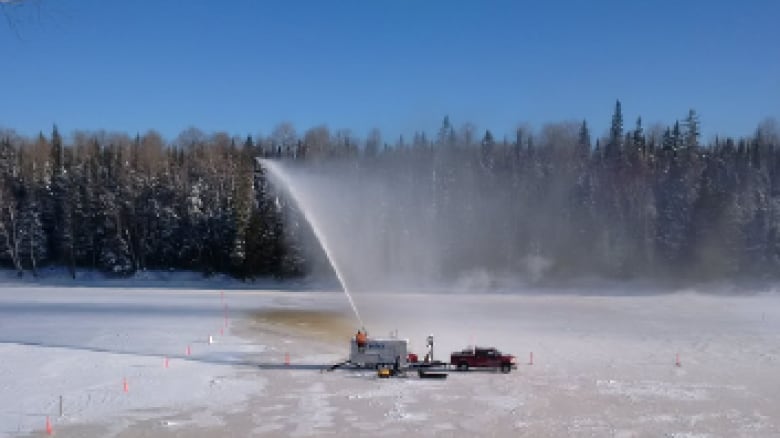Yukon gov't to build an 'ice Band-Aid' across river at Dawson City
Engineers will use 'spray technology' to help build an ice bridge for winter crossing
The Yukon government will try to "nudge Mother Nature along" this winter by hiring engineers to help the Yukon River freeze over at Dawson City.
"Basically, the plan that's been proposed is to take water in Dawson and spray it into the river to help facilitate the freezing," said Public Works Minister Richard Mostyn.
"Mother Nature is sort of a fickle mistress, and we're going to help her create an ice bridge across the Yukon River."
Every winter, the Yukon government maintains an ice road crossing of the river at Dawson. About 100 people live across the water from the main town site, in West Dawson, and rely on the connection.
Last year, however, the river never completely froze over where that government crossing normally is. This year looks similar, so far — there's still a stretch of open water.
"So we're going to take action," Mostyn said.
The government typically spends about $80,000 each winter to build and maintain the ice crossing. This year's plan — with an "ice Band-Aid across the channel," as Mostyn calls it — will cost about $100,000.

'Spray technology'
Volker Neth, an ice engineer with Tetra Tech, the engineering firm heading up the project, says it will involve "spray technology."
"We pump up the water, shoot it into the air ... this hopefully will bind to the existing ice, and any ice floes which come down the river will be glued together with this method," Neth said.
"The idea is that we can form an ice cover, sooner."
Neth says he's used such a technique elsewhere in Canada, including the high Arctic, but it's never been tried on the fast-moving Yukon River.
No guarantees
Mostyn admits the whole thing is a bit of an experiment, "to sort of nudge Mother Nature along."
"We're fairly confident we're going to be able to carry this out. There are no guarantees," he said.
"Things are changing up here. The climate is not what it once was, so we're going to have to be innovative ... And this is one of the projects we're going to start with."
He expects the engineers to begin work in early January.
More from CBC North:
With files from Alexandra Byers and Claudiane Samson